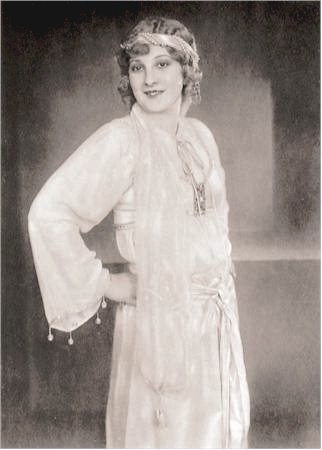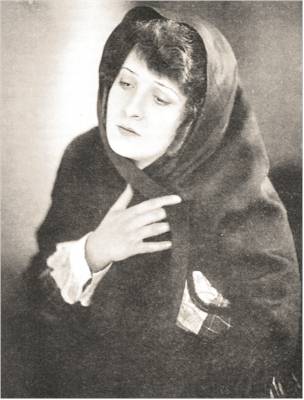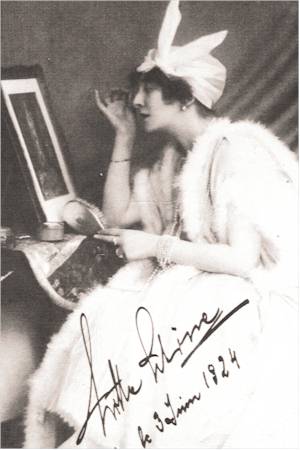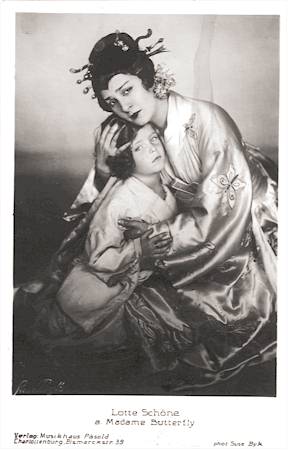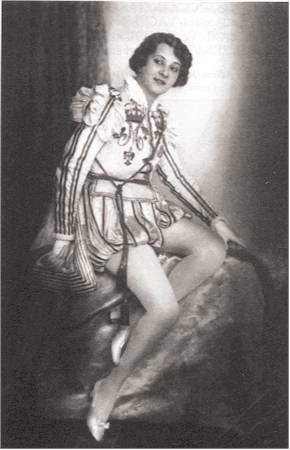Austrian-French soprano, 1891 - 1977 Biographical notes: (by André Tubeuf) 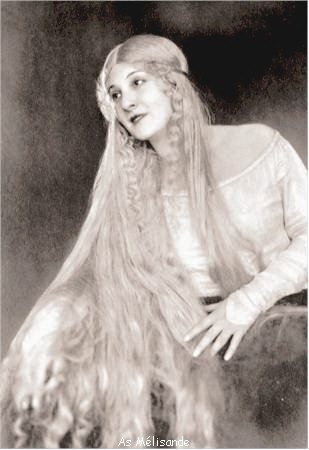 Lotte Schöne was one of the few opera singers in the inter-war years who achieved world fame without having to leave her artistic home. Both Vienna and Berlin had signed her up for eight seasons before she
had to leave Germany in 1933. Festival appearances in Salzburg, France and occasional appearances in London, Florence, the Netherlands and Budapest only reinforce the fact that Lotte Schöne
achieved stardom on the premise of home-grown experience. Naturally this presupposed that she was fortunate enough to work with peak ensembles: in Vienna under the aegis of Franz Schalk until 1926
and subsequently under Bruno Walter in Berlin. The fidelity to her “stages” (447 performances during eight seasons in Vienna, 476 in Berlin) and a most harmonious family life virtually precluded
travelling. However, it enabled a complete unfolding of both her artistic and human abilities and an expansion of her repertoire beyond those soubrette and page roles to which she was initially confined. Her
enchanting appearance, her exquisite head voice and her legato predestined her for Cherubino and Susanna, Oscar
and Urbain, Musetta, Norina and Adele. She was equally lauded in lyric roles like Gilda and the Goose girl. Her lively
Papagena, Blonde and Philine were exemplary during her early years in Vienna. It was typical for Bruno Walter’s attitude to music and singers that beneath her joie de vivre and the sparkling
gaity of her coloratura ability he discerned the quintessential nostalgia of her expressivity and persuaded her not to sing Musetta for her debut role in Berlin, which she had often sung in
Vienna, but rather Mimì - a role not automatically associated with her. Her eight years in Berlin were the early apex of a career that was to be tragically cut short by persecution and exile. In
Berlin she no longer sang Papagena but Pamina; she sang her first Mélisande and Liù in the first performance in Germany. To all these she brought her deepest, most profound artistry. As Pamina
she also triumphed in Salzurg and Holland. In Londan she was acclaimed as Liù and in France she became the Mélisande par
Lotte Schöne was one of the few opera singers in the inter-war years who achieved world fame without having to leave her artistic home. Both Vienna and Berlin had signed her up for eight seasons before she
had to leave Germany in 1933. Festival appearances in Salzburg, France and occasional appearances in London, Florence, the Netherlands and Budapest only reinforce the fact that Lotte Schöne
achieved stardom on the premise of home-grown experience. Naturally this presupposed that she was fortunate enough to work with peak ensembles: in Vienna under the aegis of Franz Schalk until 1926
and subsequently under Bruno Walter in Berlin. The fidelity to her “stages” (447 performances during eight seasons in Vienna, 476 in Berlin) and a most harmonious family life virtually precluded
travelling. However, it enabled a complete unfolding of both her artistic and human abilities and an expansion of her repertoire beyond those soubrette and page roles to which she was initially confined. Her
enchanting appearance, her exquisite head voice and her legato predestined her for Cherubino and Susanna, Oscar
and Urbain, Musetta, Norina and Adele. She was equally lauded in lyric roles like Gilda and the Goose girl. Her lively
Papagena, Blonde and Philine were exemplary during her early years in Vienna. It was typical for Bruno Walter’s attitude to music and singers that beneath her joie de vivre and the sparkling
gaity of her coloratura ability he discerned the quintessential nostalgia of her expressivity and persuaded her not to sing Musetta for her debut role in Berlin, which she had often sung in
Vienna, but rather Mimì - a role not automatically associated with her. Her eight years in Berlin were the early apex of a career that was to be tragically cut short by persecution and exile. In
Berlin she no longer sang Papagena but Pamina; she sang her first Mélisande and Liù in the first performance in Germany. To all these she brought her deepest, most profound artistry. As Pamina
she also triumphed in Salzurg and Holland. In Londan she was acclaimed as Liù and in France she became the Mélisande par 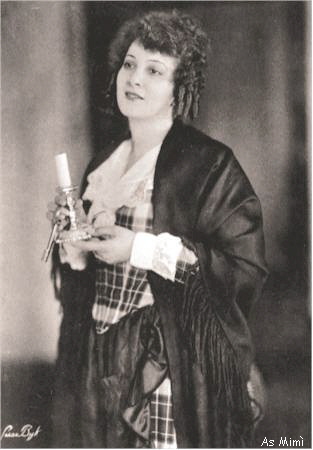 excellence - highly unusual for a foreigner. Butterfly was a further extention of her lyric expressivity. The witty, extroverted side of her multiple
talents was by no means ignored and was particularly evident in role like Annina in A Night in Venice, Adina in L’Elisire d’amore, Cenerentola and Despina. All these roles she sang during her last years in Berlin.
When she gave her farewell performance on June 12, 1933 as Gilda (conducted by her old friend Leo Blech) she received a standing ovation. Her audience knew she had to leave and they also knew why. Lotte
Schöne’s voice was Viennise in its coloration. It had the same charm, the same engaging smile, the same exquisite floating tones, the same vocal quality that Elisabeth also evinced. Lotte Schöne shared
Elisabeth Schumann’s roles but she had more profound lyrical possibilities and a better coloratura technique. Her records (the acoustic Vox and Odeon recordings as well as the electric HMVs) included
operetta, lied as well as Mozart and Puccini roles and mirror precisely her exquisite timbre and legato. They even show what dramatic developments could be
expected had she not been forced to leave her native country at the age of barely 40. Her Manon is one of the most beautiful and touching renditions ever recorded, although, not least
because of the challenging Saint-Sulpice scene, she never sang the role on stage. Lotte Schöne was also a splendid operetta singer. She sang her first Adele under Felix Weingartner at the
Volksoper, she also sang the same role in Paris in a Max Reinhardt production. Her Amina opposite Helge Rosvaenge and Marcel Wittrisch was no less famous. She was also a superb lieder
singer, much admired by Richard Strauss. excellence - highly unusual for a foreigner. Butterfly was a further extention of her lyric expressivity. The witty, extroverted side of her multiple
talents was by no means ignored and was particularly evident in role like Annina in A Night in Venice, Adina in L’Elisire d’amore, Cenerentola and Despina. All these roles she sang during her last years in Berlin.
When she gave her farewell performance on June 12, 1933 as Gilda (conducted by her old friend Leo Blech) she received a standing ovation. Her audience knew she had to leave and they also knew why. Lotte
Schöne’s voice was Viennise in its coloration. It had the same charm, the same engaging smile, the same exquisite floating tones, the same vocal quality that Elisabeth also evinced. Lotte Schöne shared
Elisabeth Schumann’s roles but she had more profound lyrical possibilities and a better coloratura technique. Her records (the acoustic Vox and Odeon recordings as well as the electric HMVs) included
operetta, lied as well as Mozart and Puccini roles and mirror precisely her exquisite timbre and legato. They even show what dramatic developments could be
expected had she not been forced to leave her native country at the age of barely 40. Her Manon is one of the most beautiful and touching renditions ever recorded, although, not least
because of the challenging Saint-Sulpice scene, she never sang the role on stage. Lotte Schöne was also a splendid operetta singer. She sang her first Adele under Felix Weingartner at the
Volksoper, she also sang the same role in Paris in a Max Reinhardt production. Her Amina opposite Helge Rosvaenge and Marcel Wittrisch was no less famous. She was also a superb lieder
singer, much admired by Richard Strauss.
As Blondchen As Mimì
Recordings: |
The Art of Lotte Schöne 1924 - 1931 (Arias/songs by Mozart, Meyerbeer, J. Strauss, Zeller, Jones, Suppé,
Millöcker, Rubinstein, Donizetti, Rossini, Nicolai, Schubert, Verdi, Puccini) |
Preiser - LV |
Four Famous Sopranos of the Past (+ Fritzi Jokl, Irene Eisinger, Luise Szabó) |
Preiser - LV |
Covent Garden on Record Vol. 4 |
Pearl |
Unvergessene Stimmen der Wiener Staatsoper |
Preiser - LV |
Mike Richter’s Opera Page: Stars of David/The Record of Singing Vol. 3 |
CD-ROM |
As Zerbinetta
My favorite recordings: - Ihr edlen Herren allhier (Urbain in Les Huguenots / Meyerbeer / Vox 1922)
Mein Herr Marquis (Adele in Die Fledermaus / J. Strauss / Odeon 1924)- Spiel’ ich die Unschuld vom Lande (Adele in Die Fledermaus / J. Strauss / Odeon 1925) - Ich bin die Christel von der Post (Christel in Der Vogelhändler / Zeller / Odeon 1925) - Tu che di gel sei cinta (Liù in Turandot / Puccini / HMV 1927)
- Tutte le feste al tempio with Herbert Janssen (Gilda in Rigoletto / Verdi / HMV 1927)
- Eines Tages seh’n wir
(Cio-Cio-San in Madame Butterfly / Puccini / HMV 1928) - Signore, ascolta (Liù in Turandot / Puccini / HMV 1928) - Ach ich fühls, es ist verschwunden
(Pamina in The Magic Flute / Mozart / HMV 1928) - Mein Herr, was dächten Sie von mir? (Adele in Die Fledermaus / J. Strauss / HMV 1928) - Mit starrem Angesicht blickt sie nach oben (Oscar in Un Ballo in Maschera / Verdi / HMV 1929) - Der Hirt auf dem Felsen (Schubert / HMV 1929)
- Leb’ wohl, mein liebes Tischchen (Title role in Manon / Massenet / HMV 1929)
- Quando m’en vo
(Musetta in La Bohème / Puccini / HMV 1929) - Nun eilt herbei
(Mrs Ford in Die lustigen Weiber von Windsor / Nicolai / HMV 1930) - Pronto io son with Willi Domgraf-Fassbaender
(Norina in Don Pasquale / Donizetti / HMV 1931) As Cio-Cio-San As Urbain in Meyerbeer’s “Les Huguenots”
|
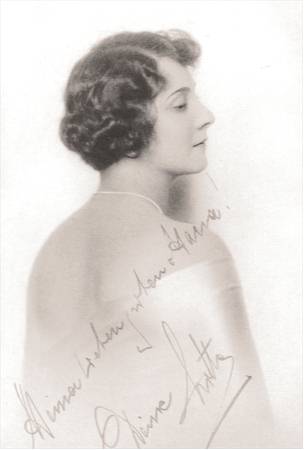
 Lotte Schöne was one of the few opera singers in the inter-war years who achieved world fame without having to leave her artistic home. Both Vienna and Berlin had signed her up for eight seasons before she
had to leave Germany in 1933. Festival appearances in Salzburg, France and occasional appearances in London, Florence, the Netherlands and Budapest only reinforce the fact that Lotte Schöne
achieved stardom on the premise of home-grown experience. Naturally this presupposed that she was fortunate enough to work with peak ensembles: in Vienna under the aegis of Franz Schalk until 1926
and subsequently under Bruno Walter in Berlin. The fidelity to her “stages” (447 performances during eight seasons in Vienna, 476 in Berlin) and a most harmonious family life virtually precluded
travelling. However, it enabled a complete unfolding of both her artistic and human abilities and an expansion of her repertoire beyond those soubrette and page roles to which she was initially confined. Her
enchanting appearance, her exquisite head voice and her legato predestined her for Cherubino and Susanna, Oscar
and Urbain, Musetta, Norina and Adele. She was equally lauded in lyric roles like Gilda and the Goose girl. Her lively
Papagena, Blonde and Philine were exemplary during her early years in Vienna. It was typical for Bruno Walter’s attitude to music and singers that beneath her joie de vivre and the sparkling
gaity of her coloratura ability he discerned the quintessential nostalgia of her expressivity and persuaded her not to sing Musetta for her debut role in Berlin, which she had often sung in
Vienna, but rather Mimì - a role not automatically associated with her. Her eight years in Berlin were the early apex of a career that was to be tragically cut short by persecution and exile. In
Berlin she no longer sang Papagena but Pamina; she sang her first Mélisande and Liù in the first performance in Germany. To all these she brought her deepest, most profound artistry. As Pamina
she also triumphed in Salzurg and Holland. In Londan she was acclaimed as Liù and in France she became the Mélisande par
Lotte Schöne was one of the few opera singers in the inter-war years who achieved world fame without having to leave her artistic home. Both Vienna and Berlin had signed her up for eight seasons before she
had to leave Germany in 1933. Festival appearances in Salzburg, France and occasional appearances in London, Florence, the Netherlands and Budapest only reinforce the fact that Lotte Schöne
achieved stardom on the premise of home-grown experience. Naturally this presupposed that she was fortunate enough to work with peak ensembles: in Vienna under the aegis of Franz Schalk until 1926
and subsequently under Bruno Walter in Berlin. The fidelity to her “stages” (447 performances during eight seasons in Vienna, 476 in Berlin) and a most harmonious family life virtually precluded
travelling. However, it enabled a complete unfolding of both her artistic and human abilities and an expansion of her repertoire beyond those soubrette and page roles to which she was initially confined. Her
enchanting appearance, her exquisite head voice and her legato predestined her for Cherubino and Susanna, Oscar
and Urbain, Musetta, Norina and Adele. She was equally lauded in lyric roles like Gilda and the Goose girl. Her lively
Papagena, Blonde and Philine were exemplary during her early years in Vienna. It was typical for Bruno Walter’s attitude to music and singers that beneath her joie de vivre and the sparkling
gaity of her coloratura ability he discerned the quintessential nostalgia of her expressivity and persuaded her not to sing Musetta for her debut role in Berlin, which she had often sung in
Vienna, but rather Mimì - a role not automatically associated with her. Her eight years in Berlin were the early apex of a career that was to be tragically cut short by persecution and exile. In
Berlin she no longer sang Papagena but Pamina; she sang her first Mélisande and Liù in the first performance in Germany. To all these she brought her deepest, most profound artistry. As Pamina
she also triumphed in Salzurg and Holland. In Londan she was acclaimed as Liù and in France she became the Mélisande par  excellence - highly unusual for a foreigner. Butterfly was a further extention of her lyric expressivity. The witty, extroverted side of her multiple
talents was by no means ignored and was particularly evident in role like Annina in A Night in Venice, Adina in L’Elisire d’amore, Cenerentola and Despina. All these roles she sang during her last years in Berlin.
When she gave her farewell performance on June 12, 1933 as Gilda (conducted by her old friend Leo Blech) she received a standing ovation. Her audience knew she had to leave and they also knew why. Lotte
Schöne’s voice was Viennise in its coloration. It had the same charm, the same engaging smile, the same exquisite floating tones, the same vocal quality that Elisabeth also evinced. Lotte Schöne shared
Elisabeth Schumann’s roles but she had more profound lyrical possibilities and a better coloratura technique. Her records (the acoustic Vox and Odeon recordings as well as the electric HMVs) included
operetta, lied as well as Mozart and Puccini roles and mirror precisely her exquisite timbre and legato. They even show what dramatic developments could be
expected had she not been forced to leave her native country at the age of barely 40. Her Manon is one of the most beautiful and touching renditions ever recorded, although, not least
because of the challenging Saint-Sulpice scene, she never sang the role on stage. Lotte Schöne was also a splendid operetta singer. She sang her first Adele under Felix Weingartner at the
Volksoper, she also sang the same role in Paris in a Max Reinhardt production. Her Amina opposite Helge Rosvaenge and Marcel Wittrisch was no less famous. She was also a superb lieder
singer, much admired by Richard Strauss.
excellence - highly unusual for a foreigner. Butterfly was a further extention of her lyric expressivity. The witty, extroverted side of her multiple
talents was by no means ignored and was particularly evident in role like Annina in A Night in Venice, Adina in L’Elisire d’amore, Cenerentola and Despina. All these roles she sang during her last years in Berlin.
When she gave her farewell performance on June 12, 1933 as Gilda (conducted by her old friend Leo Blech) she received a standing ovation. Her audience knew she had to leave and they also knew why. Lotte
Schöne’s voice was Viennise in its coloration. It had the same charm, the same engaging smile, the same exquisite floating tones, the same vocal quality that Elisabeth also evinced. Lotte Schöne shared
Elisabeth Schumann’s roles but she had more profound lyrical possibilities and a better coloratura technique. Her records (the acoustic Vox and Odeon recordings as well as the electric HMVs) included
operetta, lied as well as Mozart and Puccini roles and mirror precisely her exquisite timbre and legato. They even show what dramatic developments could be
expected had she not been forced to leave her native country at the age of barely 40. Her Manon is one of the most beautiful and touching renditions ever recorded, although, not least
because of the challenging Saint-Sulpice scene, she never sang the role on stage. Lotte Schöne was also a splendid operetta singer. She sang her first Adele under Felix Weingartner at the
Volksoper, she also sang the same role in Paris in a Max Reinhardt production. Her Amina opposite Helge Rosvaenge and Marcel Wittrisch was no less famous. She was also a superb lieder
singer, much admired by Richard Strauss.